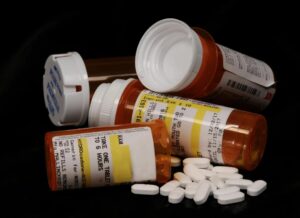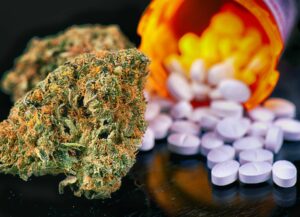Curious about the interactions between cannabis and opioids?
Meet Dr. Adie Poe, Ph.D., a neuroscientist who has spent 13 years researching the synergistic relationship between these two controversial substances. Dr. Poe is a global leader in opioid and cannabis research. She’s one of the few neuroscientists in the U.S. to be consistently funded for cannabis research by the National Institute on Drug Abuse (NIDA). Dr. Poe has received numerous awards for her cutting-edge work and continues to fight for research that will help patients find safe pain relief and an improved quality of life.
Dr. Poe is also the co-founder and Chief Scientific Officer of Habu Health, where she works on bringing personalized medicine to the cannabis space. She has also recently partnered with Goldleaf on a new edition of its patient journal, a book designed to help patients track and improve their cannabis experience.
FOLLOW US ON FACEBOOK & INSTAGRAM
We interviewed Dr. Poe to get her expert opinion on cannabis and opioids. And to learn all about her projects helping patients find the right cannabis for their needs.
How did you get started in cannabis research?
Dr. Adie Poe: It really began as an undergrad. My undergraduate degree is in psychology, and I was volunteering in a lab that studies opioid tolerance. I had also been spending a bunch of time in Vancouver, British Columbia, and noticed that the heroin problem was quite bad.
But the difference between where I was in school and British Columbia was that cannabis was decriminalized [in Canada], and all the illicit heroin and opioid users were also using cannabis. I knew that these drugs were both analgesic and that they actually had a synergistic analgesic interaction. They create better pain relief together than they do on their own.
So, I was interested in exploring that idea further. If these things are truly synergistic, could we use them in combination rather than opioids on their own? Could we reduce the requirement of opioids needed to achieve pain relief? I wrote a small grant as an undergrad, and it was funded. I eventually rolled that into my Ph.D. thesis and two additional grants from NIDA.
The central hypothesis of my work is that these things can be used in combination so that we can reduce the negative side effects of opioids while still having effective pain relief. That’s still the nature of my work to this day. I’ve been very fortunate to be funded by NIDA for all of these years.
What are the next steps that need to be taken to help the current situation with pain management?
AP: I think the single greatest barrier is cannabis’s status as a Schedule 1 substance. The status quo right now is that cannabis can really only be studied under the umbrella of addiction one way or another.
So, my backdoor is that I’m reducing addiction through cannabis. When Schedule 1 goes away, researchers like myself can look at the beneficial properties of cannabis, not just the addictive properties or cannabis as an influence on addiction. When anyone can apply for any grant, for any purpose, that will dramatically shift things.
Policy-wise, I really liked what the state of Illinois has done. If you have a prescription for an opioid in your hand, you automatically qualify for the medical cannabis program in that state.
This is a no-brainer. If cannabis is an analgesic drug, and if you have a prescription for an analgesic drug, you should have the legal option to consume an analgesic drug that’s safer than the opioid prescription you have.
I would love to see those kinds of policies rolled out immediately. We have an immediate problem that we need to do something about. Now.
Do you have any suggestions for patients who are struggling with opioids right now and considering cannabis?
AP: People have very different requirements. Not all pain is the same. So, without giving any specific recommendations, what I can say is that people who are in pain report that they like cannabis better, and they prefer it over their opioids. The vast majority, more than 90% of patients, would rather consume cannabis than the opioids. The side effects are more manageable. Their lifestyle is better.
Opioids are extremely effective at completely obliterating the bodily sensation of pain. But they’re also obliterating your ability to feel connected with your family and your ability to function at work. It severely impairs people. It inhibits cognitive function. So, people report that their quality of life is better with cannabis, even if their bodily sensation of pain isn’t completely eliminated by it. The overall quality of their life is enhanced because of all of those factors.
RELATED: HOW CANNABIS CAN BREAK THE CYCLE OF OPIOID ABUSE
What can you tell us about your work at Habu Health?
AP: The mission at Habu Health is personalized precision medicine. People have different kinds of pain; people have different kinds of lifestyle needs; and the body’s endogenous cannabinoid system is extremely variable from person to person. Fortunately, there are enough kinds of cannabis out there ,and there are enough ways to consume it that everyone could potentially have their health care needs met and their quality of life improved.
People are already using this to improve their life, but very few people are tracking exactly what it is in these products. What is causing that quality of life improvement? So that’s really what we’re doing. We’re applying scientific rigor to the naturalistic way that people already consume cannabis so that we can figure out what’s best for whom. We’re still in the startup phase, but we’re developing software that will essentially allow us to track this.
Tell us about your collaboration with Goldleaf on its patient journal. What did you add to the journal that wasn’t in the last edition?
AP: Really, the shift from the previous edition was in putting the emphasis on pharmacology. Pharmacology is about the ingredients in drugs and how they interact with the human body to produce a certain effect.
The previous edition was really focused on strain recommendations. What we know is that strain names are completely arbitrary. They have no predictive value whatsoever when it comes to a reliable medical result. Even if you’re buying the same strain from the same cultivator, time after time, we know that there are chemical differences in that plant from harvest to harvest.
So, what’s really important in this edition is that we’ve shifted the focus away from strains and put it on chemistry. What are the chemicals in your medicines that are causing you to have that effect?
Before we end, is there anything we haven’t talked about that you would like to share?
AP: The thing that I have been really fired up about lately is the lack of useful medical products in the regulated market. I spend quite a bit of time in Oregon, and the vast majority of products are above the 20% tetrahydrocannabinol (THC) mark. The market has created value for these things. Wholesalers pay more for products that are above 20% THC.
But that doesn’t mean that those products have the most medical value. Just because they’re valued by the wholesaler doesn’t mean they’re valuable to the patient.
What we’ve really seen through the scientific literature and through surveys of medical patients is that really, we need a rich balance of cannabinoids and terpenes. We need diverse full-spectrum phytochemistry. But we need to limit intoxication. These folks still need to go to work and have functioning daytime lives.
What I’d really like to see is more value placed on products that have true medical value, true value to the patients. Those that have a balanced ratio of THC and cannabidiol (CBD) or very little THC at all, but still contain all of those other beautiful terpenes and cannabinoids that have medical benefit.
If you’re new to cannabis and want to learn more, take a look at our Cannabis 101 post. HelloMD can help you get your medical marijuana recommendation; it’s easy, private and 100% online.






